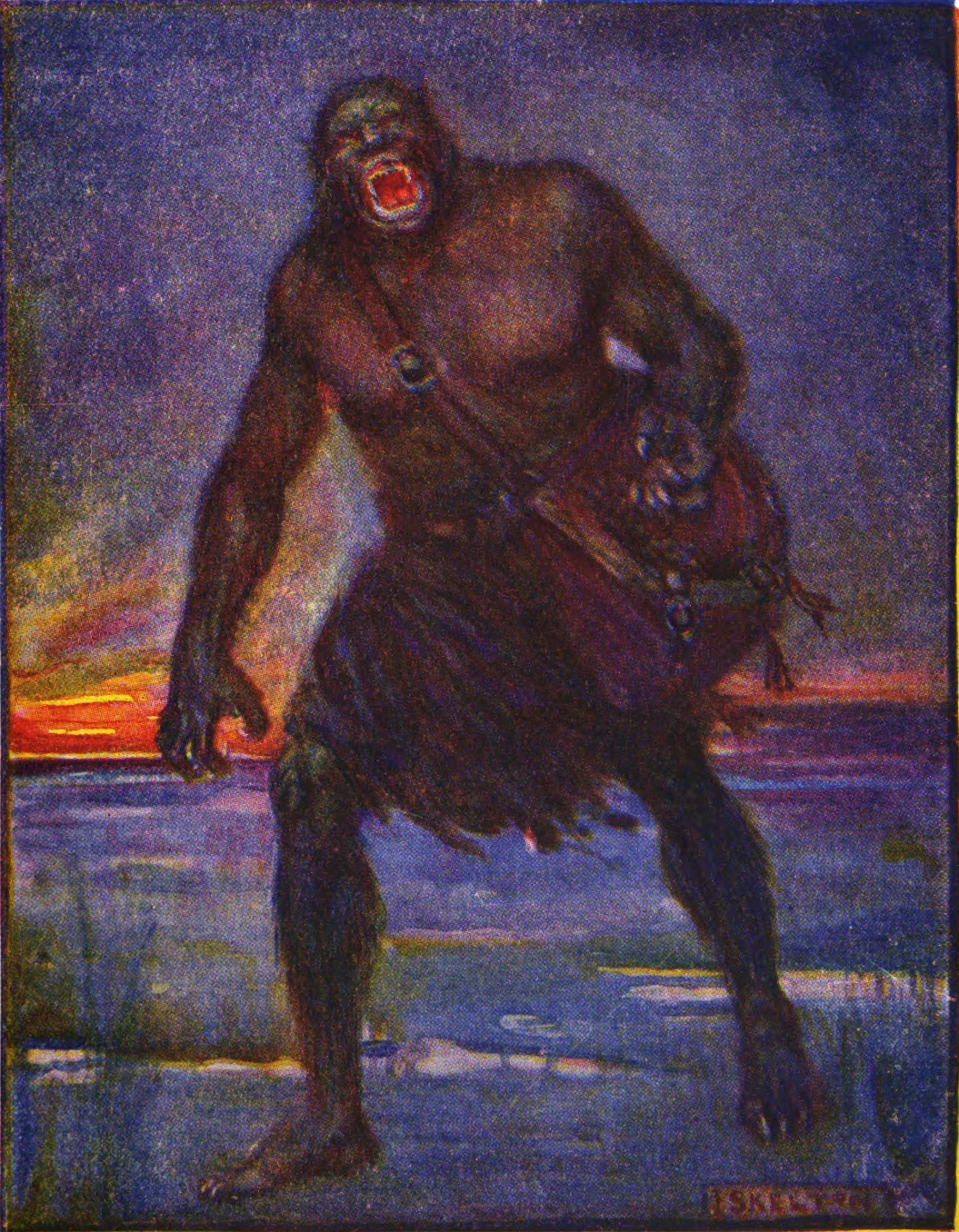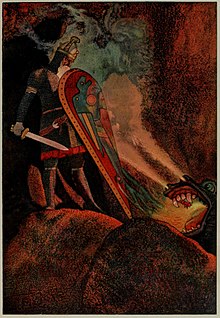There is a common trend in literature involving heroes; conflicts, resolutions, struggles, triumphs. A hero really isn't a hero unless they've done something heroic. Story tellers have been coming up with different ways of putting characters through trials and issues since the beginning, many having wildly different approaches. One of the most classic examples of a hero's story comes from Beowulf, aka the oldest piece of surviving Old English literature found to date. His astounding deeds and total badassery make for a great hero story; he kills the bad guys, becomes king, gets loot, and dies after killing off a dragon at the very end. Great stuff, all be it a little rudimentary. However, certain key elements to his story point to connections to another hero's tale; the Saga of Grettir the Strong.
 Grettir's Saga takes a much different approach to the "hero" story, and the use of the word "hero" often comes into question throughout. The author of Grettir's Saga took the normal hero role, but makes the "hero" aspect begin to fade and blur as the story progresses, leading to an interesting and more debatable narrative to the main protagonist's actions. Grettir goes through the same elements of heroism as Beowulf does (killing baddies and such), but gets a little carried away in the stereotypical Viking sense, killing a few more in... "highly questionable" acts of "heroism". Overall, the key difference is that at Grettir's peak in strength and regarded heroism, an evil spirit curses him and begins his downfall. His life takes turn after turn for the worse, and at the end of the book, he dies an infamous outlaw.
Grettir's Saga takes a much different approach to the "hero" story, and the use of the word "hero" often comes into question throughout. The author of Grettir's Saga took the normal hero role, but makes the "hero" aspect begin to fade and blur as the story progresses, leading to an interesting and more debatable narrative to the main protagonist's actions. Grettir goes through the same elements of heroism as Beowulf does (killing baddies and such), but gets a little carried away in the stereotypical Viking sense, killing a few more in... "highly questionable" acts of "heroism". Overall, the key difference is that at Grettir's peak in strength and regarded heroism, an evil spirit curses him and begins his downfall. His life takes turn after turn for the worse, and at the end of the book, he dies an infamous outlaw.Overall, the key difference of the two is by far the approach to the "hero's journey," Grettir the Strong's leaving the reader with the point of "hero" much more debatable than the flatly stated "lived a hero, died a hero," type found in Beowulf. Getting into certain key elements of the story, some very large similarities do begin to arise however, and that has led many to believe that the two may have bridged from one another.

 The main corelation between these two stories are the key monsters they fight, Grettir's being the deformed corpse of a spirit possessed shepard (Glam), and Beowulf's being the notorious hulking troll like creature (Grendel). Both heroes come to fight these creatures in a similar way; a town needs help and enlists them to kill the beasts that have been wreaking havoc upon them. And again, both heroes pretend to be asleep and catch the monster off guard, and both even take on the monster unarmed! (Unarmed having a bit more context in Grendel's case, heheheh) Here we see yet more similarities where the monster's both try to escape, but end up being pinned by the heroes grasp. The differences begin to arise here when Beowulf one ups Grettir in straight up ripping Grendel's arm off at the shoulder, Grettir just dropping Glam on the floor exhausted after tackling him out the door. And while Grendel escapes (to just die shortly after), Glam is beheaded by Grettir's sword (which he probably should have used earlier come to think of it).
The main corelation between these two stories are the key monsters they fight, Grettir's being the deformed corpse of a spirit possessed shepard (Glam), and Beowulf's being the notorious hulking troll like creature (Grendel). Both heroes come to fight these creatures in a similar way; a town needs help and enlists them to kill the beasts that have been wreaking havoc upon them. And again, both heroes pretend to be asleep and catch the monster off guard, and both even take on the monster unarmed! (Unarmed having a bit more context in Grendel's case, heheheh) Here we see yet more similarities where the monster's both try to escape, but end up being pinned by the heroes grasp. The differences begin to arise here when Beowulf one ups Grettir in straight up ripping Grendel's arm off at the shoulder, Grettir just dropping Glam on the floor exhausted after tackling him out the door. And while Grendel escapes (to just die shortly after), Glam is beheaded by Grettir's sword (which he probably should have used earlier come to think of it).The events stemming from this monster slaying also lead to complete polar opposites, a brief and partial connection technically being able to be made immediately afterwards. Grendel's mother comes and seeks revenge for her dead son and leading to more conflict, and Glam puts a curse on Grettir that makes him afraid of the dark, being alone, and also less heroic and strong from that day forth. While Grendel's mother is an issue, Beowulf takes her down too, pushing him to be the king of the Geats, while Grettir's story begins to turn downhill as everything starts to go wrong for him.
In conclusion, I'd say it's neat that these two heroes wrestled evil monsters in the middle of the night and killed them, but the similarities end there. Both are great stories none the less, and reading Grettir the Strong has certainly made me more appreciative of ancient literature, as I've started even looking into other old stories to read after.

I agree that Grettir's saga subverts the traditional definition of a hero. Grettir is proven to be more of an "antihero", actually. He is shown to have little to no admirable traits, yet he is the protagonist of the saga. I think that this indicates to the reader that a what constitutes a "hero" is much broader than what was initially thought. It seems like a "hero" is just an extremely competent individual who slays beasts and has a superhuman level of strength. Their actual personality, and the content of their character, however, is not guaranteed to be honorable and just. Beowulf never skins horses alive.
ReplyDelete